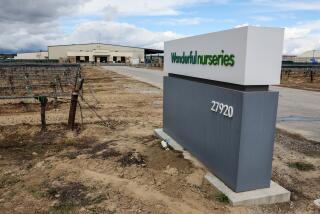Calls It ‘Declaration of War on Rural America’ : Farm Union Assails Reagan Veto of Credit Legislation
- Share via
PHOENIX — The president of the National Farmers Union on Wednesday called President Reagan’s veto of emergency farm credit legislation “a sadistic display of theatrics” and House Speaker Thomas P. (Tip) O’Neill Jr.’s decision not to push for an override “a most unfortunate display of weakness.”
At the same time, the farmers’ union president, Cy Carpenter, urged farmers and rural businessmen to give congressmen returning to their home districts this weekend a “rural reception” and “demand accountability of those who did not support the farm relief measure.”
Carpenter had originally called for a massive campaign in Washington and rural America to win support for an override of the veto. But, in the capital, the bill’s sponsors announced immediately that there would be no override attempt. O’Neill (D-Mass.) called Reagan’s ability to sustain the veto “a foregone conclusion.”
‘A Declaration of War’
In Phoenix, where the National Farmers Union wound up its 83rd annual meeting Wednesday, the 900 delegates approved a statement saying that the veto “approaches a declaration of war on rural America.”
The convention adopted a resolution calling on the Administration and Congress to impose a one-year moratorium on agricultural loan foreclosures by federal lending agencies and the quasi-governmental Farm Credit Administration, the largest holder of such loans.
Reaction to Reagan’s veto from other farm organization leaders and from farmers themselves was swift and angry.
“It’s a real tragedy,” said DeVon Woodland, president of the National Farmers Organization. “It shows a callous disregard for the needs of middle America.”
A Show of Unity
“He indicates to agriculture that he really doesn’t believe they are in serious financial trouble,” said Ed Anderson, the master--or chief executive--of the 400,000-member National Grange.
Both Woodland and Anderson attended and addressed the meeting of the rival National Farmers Union in an extraordinary show of unity over the economic crisis that is gripping rural America.
Farmers here remained hopeful right up until the announcement of the veto.
“Now, I might be on the auction block,” said Elvert Torkelson, 47, a Murdock, Minn., farmer who had hoped to get aid from the legislation. A third generation farmer, he has had an application for a spring planting loan pending since before Christmas.
“I guess the President isn’t going to listen to nobody,” Torkelson said.
‘We Lost the Farm’
“The veto reminds me of my dad coming back from the Omaha stockyards and telling my mother, ‘We lost the farm,’ ” said Iowa farmer Peter T. Croghan. “There are a hell of a lot of people who lost their homes and farms with that veto, and it is a sad day in American history.”
“The veto is going to kill the family farm,” said farmer William Genzen, 43, of Manilla, Iowa. “When he found out the Pentagon was going to spend $600 for a toilet seat, why didn’t he (Reagan) veto that?”
“He’s singling out agriculture and saying people who produce food aren’t important,” said Vernon Franke, an Akron, Colo., wheat farmer.
Bob Bergland, former secretary of agriculture under President Jimmy Carter, called the veto a “strange irony.”
‘Running Up the Deficit’
“He’s running up the country’s deficit at a record-setting pace and he’s preaching to these young kids about debt management,” said Bergland, who is executive vice president of the National Rural Electric Cooperative Assn.
Agricultural economists say that about 30% of the nation’s farmers currently have debts that make their survival questionable. Most of those debts have been the result of heavy borrowing coupled with low crop prices, high interest rates and weak export markets. As many as 200,000 farmers could be forced off the land this year and in the early months of 1986, the economists say.
More to Read
Get the L.A. Times Politics newsletter
Deeply reported insights into legislation, politics and policy from Sacramento, Washington and beyond. In your inbox twice per week.
You may occasionally receive promotional content from the Los Angeles Times.









